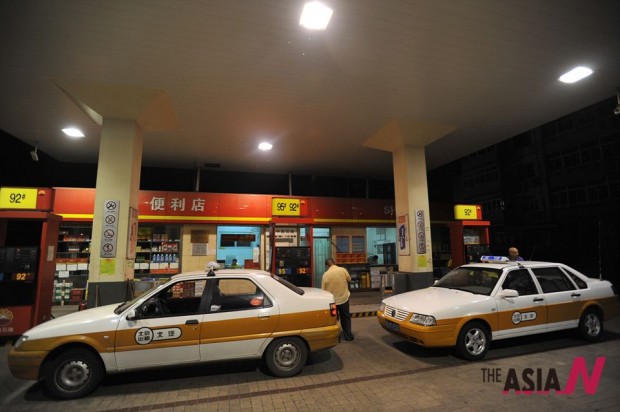Public complains of poor taxi service in Beijing

Taxi drivers stop their cars to refuel at a gas station in Beijing, capital of China, in the early morning on June 9, 2012. <File Photo/Xinhua>
BEIJING, June 11 (Xinhua) — Long waits for taxis in the summer heat and the poor attitudes occasionally shown by taxi drivers have led some to complain about the poor state of taxi service in Beijing.
The city’s vast population means that passengers aren’t in much of a position to pick and choose when they want to take a taxi. Cabbies can choose whether or not to pick up passengers, depending on whether their destination will be too long or too short.
Microbloggers on Sina.com, a popular Chinese web portal, have posted multiple complaints about the city’s taxis.
“It’s very difficult to get a taxi, especially on Monday morning when everyone rushes to work. What’s most unacceptable is that many taxis drivers totally ignore me!” one user wrote.
“I queued for nearly an hour at the Beijing West Railway Station before I finally got my taxi,” another posted.
The difficulty in getting a taxi is often blamed on a lack of interest on the part of the drivers. However, the cabbies have struggles of their own.
A Beijing cab driver surnamed Gu said cabbies sacrifice their health to do the job, working long hours for little pay.
“The profits are very thin with this job. We lose money when we hit traffic jams. Many older drivers in the urban districts are quitting. Now the drivers are coming from the suburbs,” Gu said, adding that he plans to quit his job next year.
A Monday report by the China Youth Daily alleged that a privileged group with franchise rights has essentially monopolized the sector, demoralizing drivers and taking most of their earnings.
Taxi companies in Beijing often charge cabbies more than 5,000 yuan (791 U.S. dollars) as a monthly vehicle rental fee. The cabbies also need to pay for gasoline and extra spending on car maintenance and fines for traffic violations. They say they have to make at least 9,000 yuan per month just to break even.
“The taxi companies are not worried at all about market risks because they have the fixed monthly rental fees. The monthly fee only goes up, but never goes down,” a taxi driver surnamed Lin complained.
The cabbies’ decreased income and long working hours have caused many drivers to completely lose interest in their jobs, which may explain the difficulties many have had in trying to successfully hail a cab, the China Youth Daily report said.
The report said taxi drivers used to earn decent incomes in the early 1990s, as licensed drivers usually worked privately without the expense of monthly rental fees.
However, this practice changed in 1996, when the municipal government created a policy that aimed to regulate the market by encouraging the establishment of taxi companies.
Experts have suggested eliminating the franchise mechanism in order to open up the market for fair competition.
“Individuals can apply for government approval to register their own business. The government can document and verify their information for customer service purposes,” said Xue Zhaofeng, who works with the law and economics research center at Peking University.
Zhang Guoqing, former head of the press department of the BAIC Group, the fifth-largest domestic automaker, said Xue’s reforms could harm the interests of taxi companies, suggesting that the government should instead exert a more forcible role in regulating the market further. <Xinhua/Sina.com>





















































